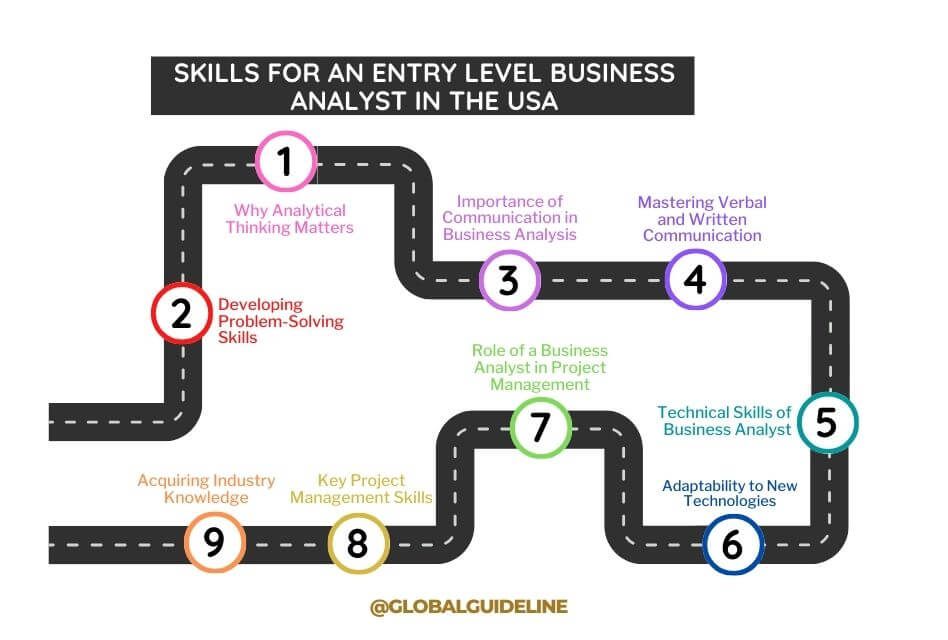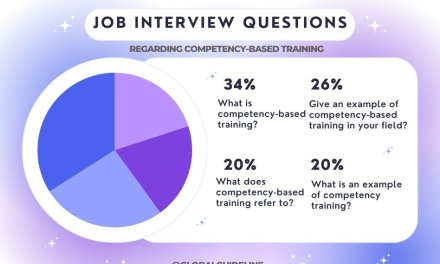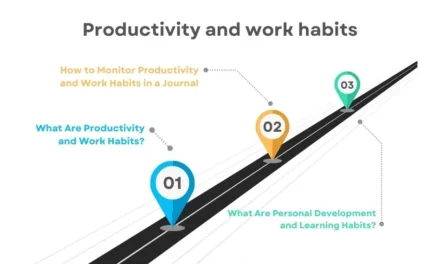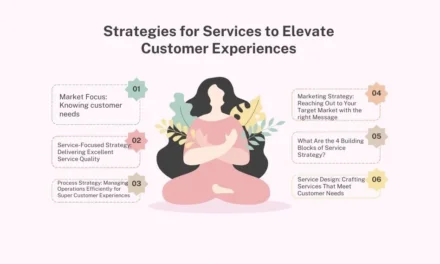In the present scenario of a data-driven business environment, the role of a business analyst is very critical. For freshers, it is a great experience to work as an entry-level business analyst, and laying a solid foundation in the field of business analysis is very much possible. The article discusses the top five skills necessary to be successful as an entry-level business analyst in the United States, providing valuable insights into how to shine in this competitive field.
Table of Contents
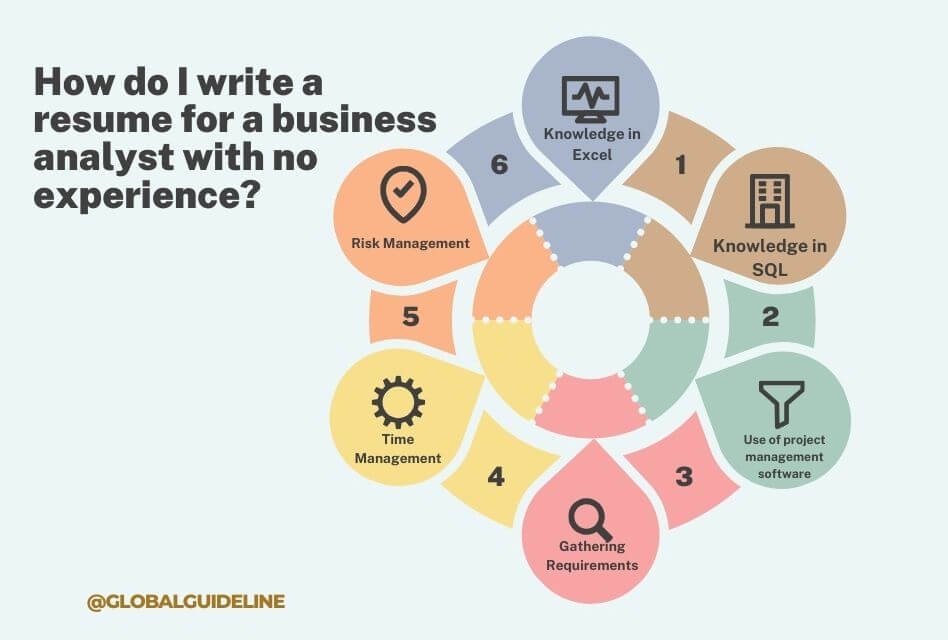
Understanding the Role: What Is Considered as an Entry Level Business Analyst?
Before that, it will be useful to know what is also known as the entry-level business analyst. The entry-level business analyst is an individual who has just graduated or has not much experience after school. These analysts report to senior analysts in any firm and are tasked with duties such as gathering requirements, analysis of data, and project management support activities.
Do I need an MBA to become a business analyst? An MBA is not always necessary when applied to entry level positions in business analyst roles. Generally, you might be okay with having a bachelor’s degree in business administration, finance, economics, or even something similar.
1. Analytical thinking and problem solving
Basic to any role that incorporates a business analyst is analytical thought and the ability to solve problems. As a junior-level business analyst you will have to work through data, identify trends, and suggest changes based on your findings. This requires a good ability to think critically and thus approach problems methodically.
Why Analytical Thinking Matters
Analytical thinking: It’s breaking up the complex problem into smaller components that can then be managed easily. In the entire gamut of data, analytical thinking enables you to deduce patterns and insights that make sense with business decisions.
Can I be a business analyst with no experience? Yes, an entry-level business analyst is all fine with a little or even no experience. Show analytical skills with a keen interest to learn: that will help you get that first job.
Developing Problem-Solving Skills
Another crucial skill of a business analyst is developing solutions. Whether the project requires the proposal of ideas on how to streamline some business processes or you’re assigned to determine the source of a problem, that extra thinking creatively and strategically is what would save you in the end.
How to get an entry level business analyst job? To find an entry-level position, focus on developing your problem-solving skills through coursework and real-world experience or internships. You can then emphasize such experience on an entry-level business analyst resume in order to prove your abilities.
2. Effective Communication Skills
Communicative ability is really important for a business analyst. Communication sometimes can be even more critical than technical content in a business analysis project. You should be able to express the most difficult ideas in a way understandable both to technical and non-technical stakeholders, whether writing reports or speaking in front of an audience, presenting the views, or facilitating meetings.
Importance of Communication in Business Analysis
As a business analyst, one is often put in a position as being in the middle management; hence, the impact of good communication is very well reputed in this scenario since everything needs to be understood by the same group of people involved in the project.
How do I write a resume for a business analyst with no experience? Even if you have no experience, you can highlight your communication skills by detailing how you have been involved in group projects, presentations, or any other role where you have to communicate complicated information clearly.
Mastering Verbal and Written Communication
Verbal and written communication is a must. Writing a business requirement document to leading a project meeting, your ability to communicate with other people will significantly determine the success of your projects.
To get entry-level business analyst jobs (no experience), effective communication skills is highly needed as a fundamental competency, therefore, do not forget to emphasize these on the resume as well as during interviews.
3. Technical Proficiency
Being in this present digital technology age, it goes to say that one has to be well equipped with any technological skill as a business analyst. Of course, you don’t have to be a software developer, but you should have experience in using various software tools, and the knowledge as to how various systems relate to each other within a business setting.
Technical Skills of Business Analyst
Some technical skills that an entry-level business analyst may find useful include:
- Knowledge in Excel: It is an analytics tool in Excel, which helps in manipulating data, and hence necessary to form complex spreadsheets.
- Knowledge in SQL: It helps understand how to write appropriate SQL queries for databases, thus enabling one to get meaningful data.
- Use of project management software: The tools are used in tracking and project task management such as Trello or JIRA and Microsoft Project.
Many entry-level positions for remote business analysts tend to have a higher level of technical competency in the toolset, as most work more independently with software tools.
Adaptability to New Technologies
Adapting or learning new technologies quickly also forms an integral part of a business analyst’s skill set. You may often be required to use different tools depending on a project, so a sense of willingness to learn and adapt holds quite key importance.
Business analyst positions that are considered more technically focused also require you to work closely with IT teams; in such cases, technical proficiency plays an even more crucial role.
4. Project Management Skills
Business analysis does not take place in a vacuum; instead, it is a critical part of project management. As soon as one is begun, you are in charge of several small-sized projects or support the management of larger projects. The knowledge of basics of project management will help one keep projects on track and ensure deliverables are met.
Role of a Business Analyst in Project Management
Without the business analysts helping clearly define and meet the business requirements of the projects, project management would not exist. Working closely with project managers and team members, ensuring timely and within-budget completion of some projects is actually involved in this.
An entry-level business analyst’s job description may be coordination meetings, tracking, and communicating with stakeholders related to management of some projects.
Key Project Management Skills
Some of the critical skills of a business analyst in terms of project management are the following:
- Gathering Requirements: It is important to know how to gather and document the business requirements for successful management of projects.
- Time Management: You cannot be able to meet your project deadlines unless you can manage to prioritize and control your time when undertaking any project.
- Risk Management: This involves identifying the potential risks in a given project and how to develop strategies to minimize or eliminate them entirely.
Is business analyst an entry level job? Business analysis, actually, is suited as an entry level job though sometimes it will hold on to responsibilities that have to do with project management principles so these skills are of much value.
5. Industry Know-how
While you are technical and analytical, a good understanding of the kind of industry where you operate is also extremely important. It enables you to give far more specific ideas in terms of application and recommendations that are relevant to industry best practices.
Acquiring Industry Knowledge
Familiarization with the industry also goes a long way in this entry-level business analyst position. Reading industry reports and following relevant news would be some of the ways; attending industry conferences and seminars can also be used.
Can I be a business analyst as a fresher? The answer is yes. You can very well start off as a business analyst straight out of college. Internships, part-time jobs, or academic projects help you build industry knowledge to place you squarely on the foundation of a successful career.
Applying Industry Knowledge
You will take the right decisions and give great recommendations to your team with understanding industry trends and challenges. Moreover, you will quickly find problems and offer new, innovative, and practically applicable solutions.
Jobs that offer entry-level business analyst roles usually look for a candidate who would be well-versed in the industry he or she will be dealing with, so bring it to the fore on your resume.
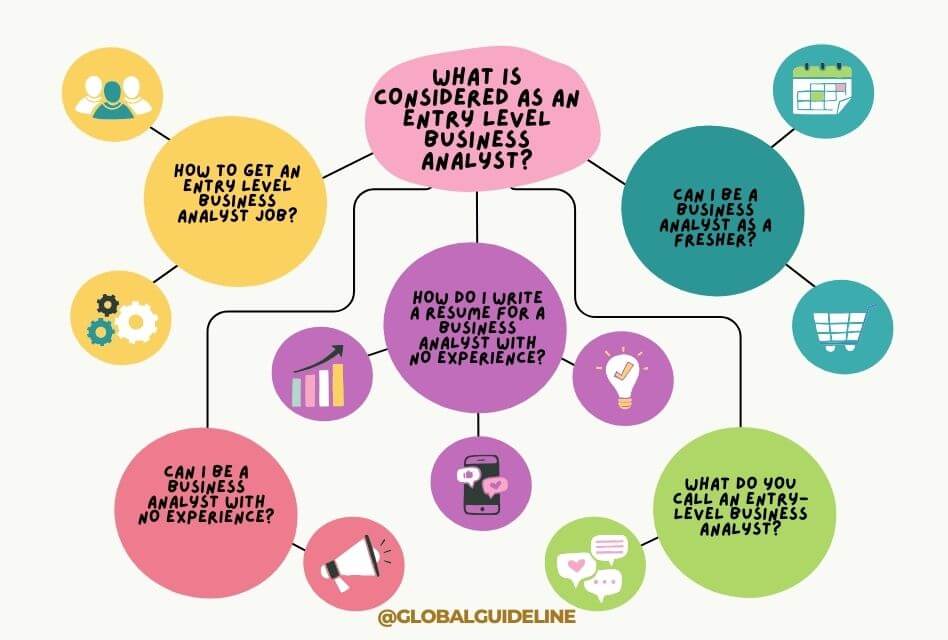
Job Interview Questions for an Entry Level Business Analyst
If you are applying for an entry-level business analyst position, then expect to answer technical as well as behavioral-type questions. Here are a few common examples:
- What do you call an entry-level business analyst?
Explain your understanding of the role and the key responsibilities involved. - How would you approach gathering requirements?
Employers need to know how you elicit and document business requirements-important for any business analyst. - Can you tell of a time when you have taken to analyze data to solve some business problem?
It will check your analytical thinking and problem-solving ability. - How do you track and manage your time if you work on a number of different projects?
Managing time is a critical skill for all business analysts, so be prepared to describe how you organize and ensure timely completion. - Why do you want a career in business analysis?
Let your employer know why you want to have a career as a business analyst and how you will grow in this career.
FAQs
1. Can a person be hired as business analyst without work experience?
Many entry-level business analyst positions are open to candidates with little or no work experience. Concentrate on developing the skills required and build up experience with internship or academic projects.
2. How do I write a resume for a business analyst with no experience?
Explain your education, relevant coursework, and projects or internships that demonstrate your skills in analysis and problem solving. Don’t forget to point out technical skills as well.
3. How much do entry level business analysts make?
On average, entry level business analyst jobs in the USA can get paid between $50,000 and $70,000 per year depending on the industry and location.
4. Do I need an MBA to become a business analyst?
An MBA is not required for entry-level business analyst positions, though it can be of value to the career later on.
5. What are the primary duties of an entry level business analyst?
Collect and analyze data, and assist with project management work, help to improve business processes.
6. How do I obtain an entry level business analyst position?
Focus on building essential skills, acquiring relevant experience through internships or part-time work, and networking within the industry.
7. Is business analyst an entry-level position?
Yes, most of the roles of a business analyst are entry level but demand a firm foundation in analytical thinking, excellent communication, and various technical skills.
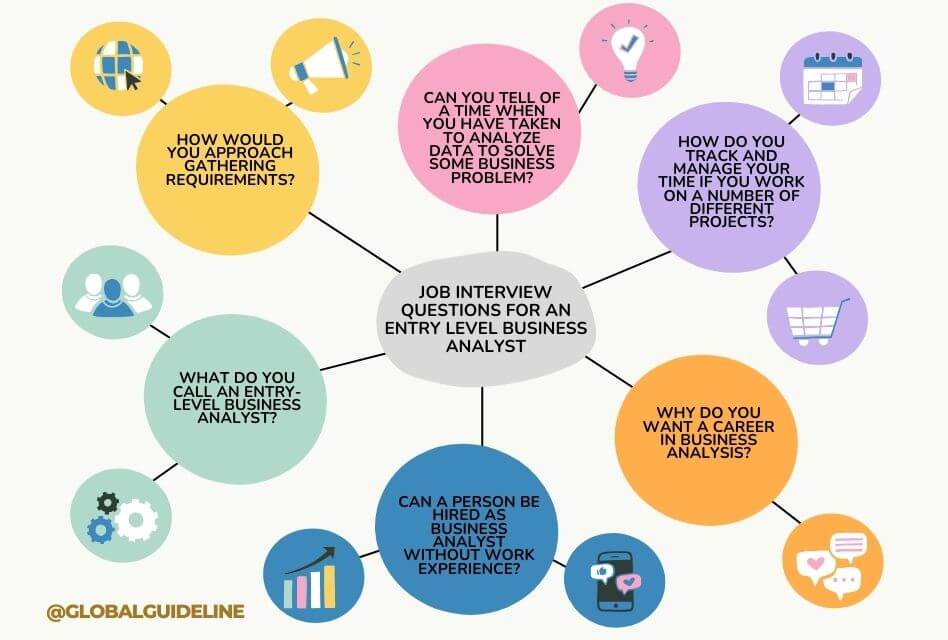
Conclusion
It is perfectly advisable to start with being an entry-level business analyst where most career development opportunities exist. Building strong analytical thinking, communication, technical proficiency, project management, and industry knowledge will help you position yourself for success in this fast-moving field of business analysis. Be it at the beginning of your career or changing careers, these skills will help you stand out in a crowded competitive job market and pave the way to a great business analytical career.
Related Posts:
7 Ways Performing Manufacturing Operations Boosts Supply Chain Success

